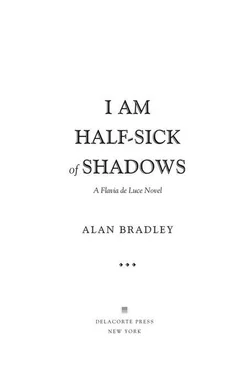Alan Bradley - I Am Half-Sick of Shadows
Здесь есть возможность читать онлайн «Alan Bradley - I Am Half-Sick of Shadows» весь текст электронной книги совершенно бесплатно (целиком полную версию без сокращений). В некоторых случаях можно слушать аудио, скачать через торрент в формате fb2 и присутствует краткое содержание. Жанр: Старинная литература, на английском языке. Описание произведения, (предисловие) а так же отзывы посетителей доступны на портале библиотеки ЛибКат.
- Название:I Am Half-Sick of Shadows
- Автор:
- Жанр:
- Год:неизвестен
- ISBN:нет данных
- Рейтинг книги:5 / 5. Голосов: 1
-
Избранное:Добавить в избранное
- Отзывы:
-
Ваша оценка:
- 100
- 1
- 2
- 3
- 4
- 5
I Am Half-Sick of Shadows: краткое содержание, описание и аннотация
Предлагаем к чтению аннотацию, описание, краткое содержание или предисловие (зависит от того, что написал сам автор книги «I Am Half-Sick of Shadows»). Если вы не нашли необходимую информацию о книге — напишите в комментариях, мы постараемся отыскать её.
I Am Half-Sick of Shadows — читать онлайн бесплатно полную книгу (весь текст) целиком
Ниже представлен текст книги, разбитый по страницам. Система сохранения места последней прочитанной страницы, позволяет с удобством читать онлайн бесплатно книгу «I Am Half-Sick of Shadows», без необходимости каждый раз заново искать на чём Вы остановились. Поставьте закладку, и сможете в любой момент перейти на страницу, на которой закончили чтение.
Интервал:
Закладка:
Because of the blowing snow, it was impossible to see as far as the Mulford Gates, but something out there was moving.
I wiped the condensation from my eyes and looked again.
Yes! A small spot of pale color—and then another—had appeared upon the landscape! In the lead was an immense pantechnicon, its scarlet color growing ever more vivid as it came growling towards me through the falling snow. Lumbering along in its wake like a procession of clockwork elephants was a string of lesser vans … two … three … four … five … no, six of them!
As the pantechnicon made its slow, stiff-jointed final turn into the forecourt, I could clearly make out the name on the side: Ilium Films , it said, in bold cream and yellow letters, painted as if in three dimensions. The lesser lorries were similarly marked, but still impressive as they pulled up in a herd around their leader.
The door of the pantechnicon swung open and a massive sandy-haired man climbed down. He was dressed in a bib overall, with a flat cap on his head and a red handkerchief wrapped round his neck.
As he crunched towards me through the snow, I was suddenly aware of Dogger at my side.
“S’truth,” the man said, wincing at the wind.
With a disbelieving shake of his head, he approached Dogger, sticking out a raw, meaty hand.
“McNulty,” he said. “Ilium Films. Transport Department. Jack-of-all-trades and master of ’em all.”
Dogger shook the huge hand but said nothing.
“Need to get this circus round back the house and out of the north wind. Fred’s generator cuts up something fierce when it gets too cold. Needs coddling, Fred’s generator does.
“What’s your name, little girl?” he asked suddenly, turning to me and crouching down. “Margaret Rose, I’ll bet. Yes, that’s it … Margaret Rose. You’re a Margaret Rose if I ever saw one.”
I had half a mind to march upstairs to my laboratory, fetch down a jar of cyanide, seize this boob’s nose, tilt his head back, pour the stuff down his throat, and hang the consequences.
Fortunately, good breeding kept me from doing so.
Margaret Rose, indeed!
“Yes, that’s right, Mr. McNulty,” I said, forcing a smile of amazement. “Margaret Rose is my name. However did you guess?”
“It’s the sixth sense I’m gifted with,” he said, with what looked like a practiced shrug. “Me Irish blood,” he added, putting on a bit of the old brogue, and giving me a saucy tip of his cloth cap as he stood up.
“Now, then,” he said, turning to Dogger, “their lordships and ladyships will be along at noon in their motorcars. They’ll be hungry as hounds after the drive down from London, so look sharp and see that you’ve got buckets of caviar laid on.”
Dogger’s face was a total blank.
“Here, I’m only joking, mate!” McNulty said, and for a horrible moment I thought he was going to dig Dogger in the ribs.
“Joking, see? We travel with our own canteen.”
He gave a jerk of his thumb to indicate one of the vans that sat patiently waiting in the forecourt.
“Joking,” Dogger said. “I understand. If you’ll be so good as to remove your boots and follow me …”
As Dogger closed the door behind him, McNulty stopped and gaped at his surroundings. He seemed particularly in awe of the two grand staircases that led up to the first floor.
“S’truth!” he said. “Do people actually live like this?”
“So I am given to believe,” Dogger said. “This way, please.”
I tagged along as Dogger gave McNulty a whirlwind tour: dining room, firearms museum, Rose Room, Blue Room, morning room …
“The drawing room and the Colonel’s study are off limits,” Dogger said, “as has been previously agreed upon. I have affixed a small white circle to each of those doors as a reminder, so that there will be no breach of—their privacy.”
He had almost said “our privacy.” I was sure of it.
“I’ll pass the word,” McNulty said. “Should be no sweat. Our lot’s pretty clannish, as well.”
We made our way through to the east wing and into the portrait gallery. I was half expecting to find it as it had been in my dream: an icy, flooded wasteland. But the room remained as it had been since time immemorial: a long dim train shed of glowering ancestors who, with just a few exceptions (Countess Daisy, for instance, who was said to have greeted visitors to Buckshaw by turning handsprings on the roof in a Chinese silk smock) seemed to have subsided, one and all, into a collective and perpetual sulk that did not exactly gladden one’s heart.
“Use of the portrait gallery has been negotiated—” Dogger was saying.
“But none of yer ’obnail boots on the floor, mind!” a voice cut in. It was Mrs. Mullet.
Hands on hips, she gave McNulty her proprietary glare, then in a softer voice said:
“Beggin’ your pardon, Dogger, but the Colonel’s off now to London for ’is stamp meet. ’E wishes to see you about the tinned beef, an’ that, before ’e goes.”
“Tinned beef” was a code word meaning that Father needed to borrow money for train and taxi fare. I had discovered this by listening at the door of Father’s study. It was a fact I wished I didn’t know.
“Of course,” Dogger said. “Excuse me for a moment.”
And he vanished in the way he does.
“You’ll have to lay down some tarpaulings on that floor,” Mrs. Mullet told McNulty. “ ‘Par-key,’ they calls it: cherry wood, mahogany, walnut, birch—six different kinds of oak is in it. Can’t ’ave workmen tramplin’ all over the likes of that, can I?”
“Believe you me, Mrs.…”
“Mullet,” said Mrs. Mullet. “With an ‘M.’ ”
“Mrs. Mullet. My name’s McNulty—also with an ‘M,’ by the way. Patrick McNulty. I can assure you that our crew at Ilium Films are hired for their fussy natures. In fact, I can confide in you—knowing it will go no further—that we’ve just come from shooting a scene inside a certain royal residence without one word of complaint from You-Know-Who.”
Mrs. M’s eyes widened.
“You mean—”
“Exactly,” McNulty said, putting a forefinger to his lips. “You’re a very shrewd woman, Mrs. Mullet. I can see that.”
She gave a flimsy smile, like the Mona Lisa, and I knew that her loyalty was bought. Whatever else he was, Patrick McNulty was as slick as nose oil.
Now Dogger was back, his face bland and capable, giving away nothing. I followed as he led the way upstairs and into the west wing.
“The room at the south end of the corridor is Miss Harriet’s boudoir. It is strictly private, and is not to be entered upon any account.”
He said this as if Harriet had just stepped out for a couple of hours to pay a social call in the county, or to ride with the Halstead-Thicket Hounds. He did not tell McNulty that my mother had been dead for ten years, and that her rooms had been preserved by Father as a shrine where no one, or so he thought, could hear him weeping.
“Understood,” McNulty said. “Over and out. I’ll pass it along.”
“The two bedrooms on the left belong to Miss Ophelia and Miss Daphne, who will share a room for the duration. Choose the one you wish to use as a setting and they’ll settle for the other.”
“Sporting of them,” McNulty said. “Val Lampman will be seeing to that. He’s our director.”
“All other bedrooms, sitting rooms, and dressing rooms, including those along the north front, may be assigned as you see fit,” Dogger went on, not batting an eye at the mention of England’s most celebrated cinema director.
Even I knew who Val Lampman was.
“I’d best be getting back to my crew,” McNulty said, with a glance at his wristwatch. “We’ll organize the lorries, then see to the unloading.”
Читать дальшеИнтервал:
Закладка:
Похожие книги на «I Am Half-Sick of Shadows»
Представляем Вашему вниманию похожие книги на «I Am Half-Sick of Shadows» списком для выбора. Мы отобрали схожую по названию и смыслу литературу в надежде предоставить читателям больше вариантов отыскать новые, интересные, ещё непрочитанные произведения.
Обсуждение, отзывы о книге «I Am Half-Sick of Shadows» и просто собственные мнения читателей. Оставьте ваши комментарии, напишите, что Вы думаете о произведении, его смысле или главных героях. Укажите что конкретно понравилось, а что нет, и почему Вы так считаете.











